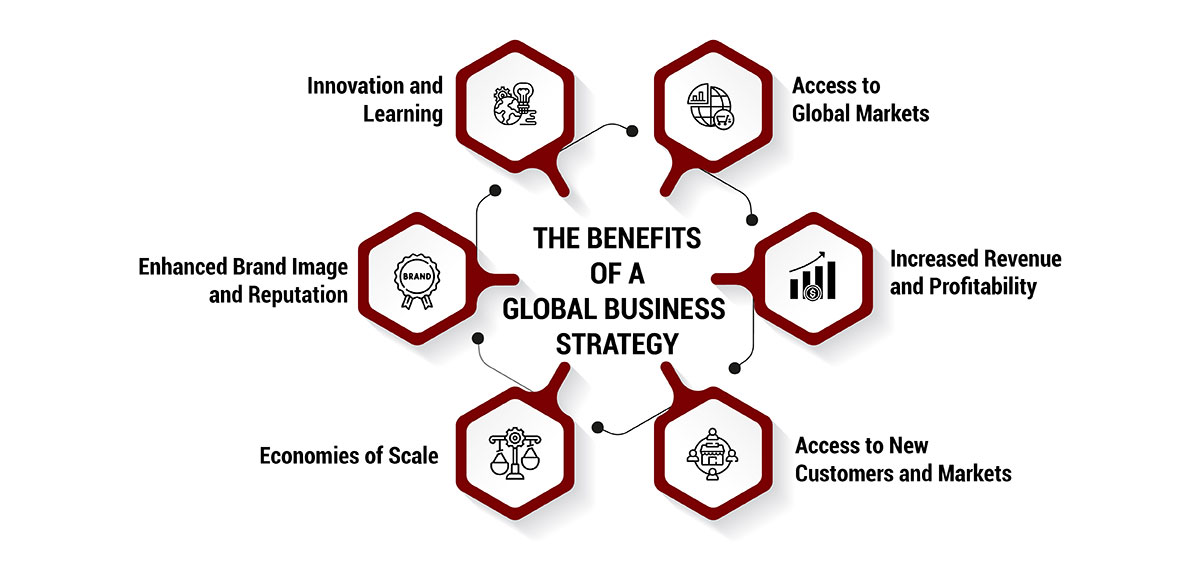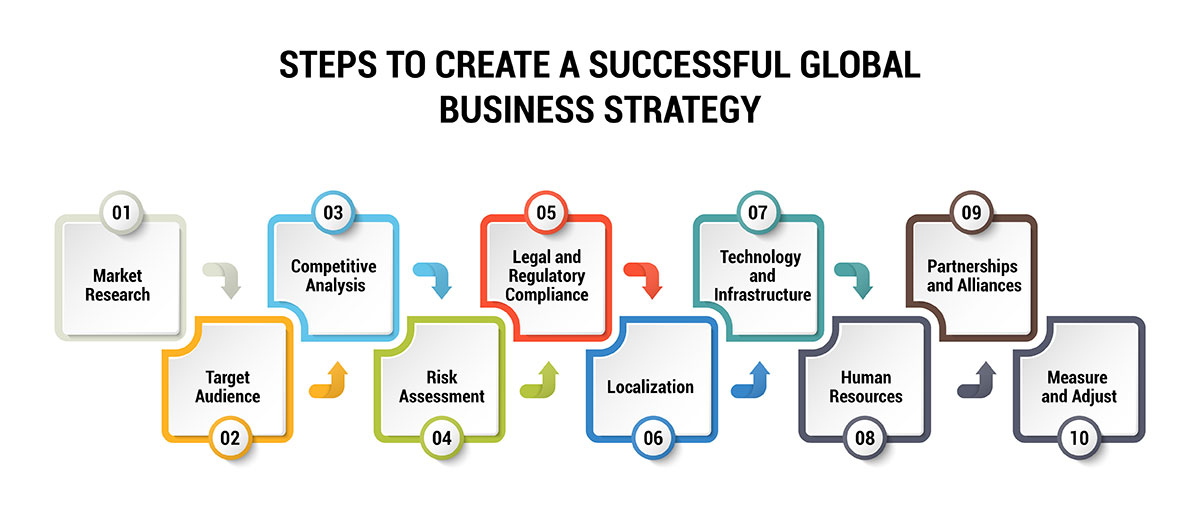How to Build a Global Strategy for Your Business?
 April 12, 2024
April 12, 2024
Crafting a global business strategy is paramount for companies that want to expand beyond geographical borders. This comprehensive approach considers market landscape, cultural shades, and regulatory frameworks to navigate international markets successfully.
This blog explores the complexities of building a global strategy that optimizes opportunities while mitigating risks. From understanding different global strategies to real-world examples from top companies, it offers valuable insights for organizations seeking sustainable growth globally.
What is a Global Business Strategy?
A global business strategy serves as a blueprint for organizations seeking to expand their operations beyond domestic borders. It encompasses a holistic approach that considers market dynamics, cultural nuances, and regulatory frameworks to formulate a plan that optimizes opportunities while mitigating risks in the global arena.
Types of Global Business Strategies
Some different approaches to building a global business strategy are as follows:

-
Global Standardization Strategy: This strategy revolves around offering uniform products and services across diverse markets, with minimal customization to cater to local preferences. Embracing this approach enables companies to leverage economies of scale and maintain a consistent brand image.
-
Localization Strategy: In contrast to standardization, localization involves tailoring products, services, and marketing strategies to align with the cultural sensitivities and preferences of specific markets. A study by Common Sense Advisory reveals that 56.2% of consumers prefer purchasing products in their native language, underscoring the importance of localization.
-
Transnational Strategy: This strategy blends elements of both standardization and localization, aiming to strike a balance between global integration and local responsiveness.
-
International Strategy: Companies pursuing an international strategy operate in multiple countries with minimal customization. They often focus on exporting products or establishing a presence through partnerships or acquisitions.
-
Globalization Strategy: This strategy seeks to establish a cohesive global presence by integrating operations across various countries. Companies adopting this approach typically exhibit a centralized decision-making process and a strong corporate culture.
Devising a global business strategy demands meticulous analysis and the adoption of a tailored approach that aligns with the organization's objectives and capabilities. Whether through standardization, localization, or a blend of both, organizations must craft strategies that resonate with the diverse demands of global markets to achieve sustainable success.
Why is a Global Business Strategy Important?
A global business strategy is crucial for organizations looking to expand their presence and thrive in today's interconnected world. It serves as a roadmap, guiding companies on how to navigate the complexities of international markets and make informed decisions that drive growth and profitability.
This strategy enables companies to expand their market reach by tapping into new and diverse markets, diversifying revenue streams, and staying ahead of the competition by understanding market trends and consumer preferences. Additionally, a global strategy allows companies to mitigate risks by spreading them across different markets and provides access to a larger talent pool globally.
Overall, a well-crafted global business strategy is instrumental in positioning companies for sustainable growth and success in the global marketplace.
What are the Benefits of a Global Business Strategy?
A meticulously crafted global business strategy offers a myriad of advantages to organizations seeking to expand their footprint and harness international opportunities.

-
Access to Global Markets: Expansion into new markets reduces reliance on any single market, spreading risks across a broader geographical area. This helps mitigate the impact of economic downturns or geopolitical uncertainties.
-
Increased Revenue and Profitability: Global expansion can lead to higher sales and revenue streams. Internationally expanding companies are more likely to experience higher revenue growth compared to those focusing solely on domestic markets.
-
Access to New Customers and Markets: A global strategy enables companies to reach new customers and tap into emerging markets with growing demand, driving sales and fueling business growth.
-
Economies of Scale: Operating globally offers economies of scale, leading to lower production costs and higher profitability. This competitive pricing edge can bolster the market position.
-
Enhanced Brand Image and Reputation: International expansion can elevate a company's brand image and reputation, positioning it as a global industry player. This can attract top talent and forge strategic partnerships.
-
Innovation and Learning: Global expansion exposes companies to new ideas, technologies, and business practices, fostering innovation and driving continuous improvement.
A global business strategy offers diverse benefits including market diversification, increased revenue, access to new customers, economies of scale, enhanced brand image, innovation, and competitive advantage. By embracing strategic international expansion, companies can position themselves for long-term success and sustainable growth.
How To Create a Successful Global Business Strategy?
Creating a successful global business strategy requires careful planning, thorough research, and a deep understanding of international markets.

-
Market Research: Conduct comprehensive market research to identify potential markets and assess their viability. This should include an analysis of market size, growth trends, competition, and regulatory environment.
-
Target Audience: Understand the needs and preferences of your target audience in different markets. This will help you tailor your products or services to meet their specific requirements.
-
Competitive Analysis: Analyze your competitors in each market to identify their strengths and weaknesses. This will help you develop strategies to differentiate your offerings and gain a competitive edge.
-
Risk Assessment: Identify potential risks and challenges associated with expanding into new markets, such as political instability, currency fluctuations, or cultural differences. Develop strategies to mitigate these risks.
-
Legal and Regulatory Compliance: Ensure compliance with local laws and regulations in each market. This may include obtaining permits, and licenses, or adhering to specific standards.
-
Localization: Adapt your products, services, and marketing strategies to suit the cultural preferences and nuances of each market. This may involve translating your materials into local languages or customizing your offerings to meet local tastes.
-
Technology and Infrastructure: Invest in technology and infrastructure to support your global operations. This may include setting up local offices, establishing distribution networks, or leveraging digital platforms for marketing and sales.
-
Human Resources: Build a diverse and talented team with experience in international markets. This will help you navigate the complexities of global business and drive success.
-
Partnerships and Alliances: Establish strategic partnerships and alliances with local businesses or organizations to expand your reach and leverage their local expertise.
-
Measure and Adjust: Continuously monitor and evaluate the performance of your global business strategy. Make adjustments as needed to ensure it remains relevant and effective in achieving your goals.
5 Global Strategy Examples from Top Companies
Studying successful global strategies from top companies can provide valuable insights into effective approaches for expanding into international markets.
-
Apple Inc.: Apple's global strategy focuses on product innovation and brand loyalty. By consistently introducing innovative products and creating a strong brand image, Apple has expanded its presence worldwide. According to Apple, its revenue from international markets accounted for 61% of the quarter’s revenue in 2020.
-
McDonald's Corporation: McDonald's global strategy emphasizes localization. The company adapts its menu and marketing strategies to suit local tastes and preferences. This approach has helped McDonald's become one of the most recognized and successful global brands. According to McDonald's 2021 Annual Report, nearly 75% of its restaurants are located outside the United States.
-
Amazon.com: Amazon's global strategy focuses on customer convenience and market penetration. By offering a wide range of products, fast delivery options, and localized services, Amazon has become the world's largest online retailer.
-
Toyota Motor Corporation: Toyota's global strategy emphasizes quality and efficiency. The company is known for its reliable and fuel-efficient vehicles, which appeal to customers worldwide. Toyota has a strong presence in various international markets, with sales offices and manufacturing plants strategically located around the globe.
-
Coca-Cola Company: Coca-Cola's global strategy revolves around brand consistency and marketing. The company maintains a consistent brand image and marketing message across different markets, while also adapting its products to suit local preferences. According to Wikipedia, Coca-Cola operates in over 200 countries and territories worldwide.
These examples demonstrate the diverse approaches companies can take to develop successful global strategies. By understanding and adapting these strategies to their own business models, companies can expand their reach and achieve sustainable growth in international markets.
Final Words
Crafting a successful global business strategy is a multifaceted endeavour requiring astute market understanding, meticulous planning, and strategic implementation. By adhering to the key steps outlined in this article, organizations can devise a roadmap that fosters expansion, fuels growth and capitalizes on global market opportunities.
Thorough market research, a deep understanding of target audiences, and a comprehensive analysis of competitors are paramount in developing a strategy that resonates with diverse markets. Flexibility and innovation play crucial roles, with companies needing to strike a balance between standardization and localization to adapt to varying cultural landscapes.
Emphasis on risk assessment and compliance with local regulations is critical to navigating the complexities of global expansion successfully. Investing in technology, infrastructure, and a skilled workforce forms the backbone of a robust global strategy.
Continual monitoring and evaluation of the strategy's efficacy are essential, enabling companies to remain agile and responsive to evolving market dynamics. By embracing these principles, companies can position themselves for sustained success and growth in the global arena.




